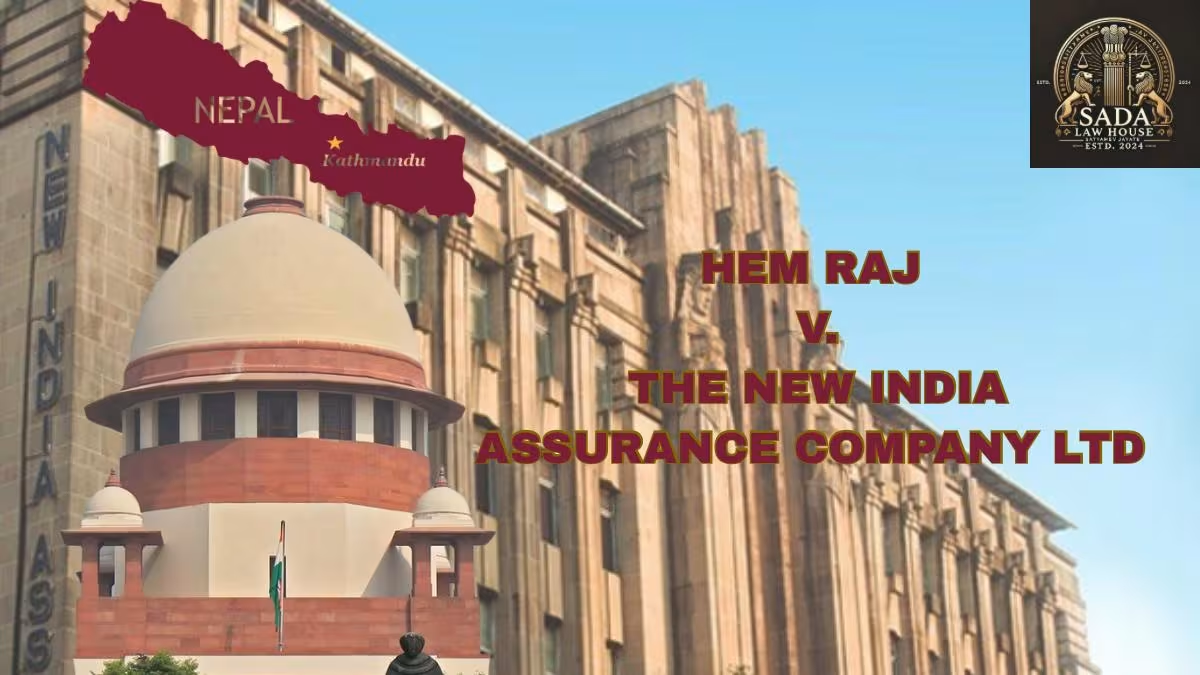Supreme Court Upholds Insured’s Right to Reimbursement for Third-Party Medical Expenses
- Prabhat Kumar Biltoria
- 10 October, 2025

Introduction:
The case of Hem Raj vs. The New India Assurance Company Ltd. concerns a dispute over a vehicle insurance claim arising from an accident in Nepal. The main issue was whether the insurer was obligated to reimburse the insured, Hem Raj, for all third-party payments made, including medical expenses, under an active insurance policy extended to cover Nepal. The case highlights the Supreme Court’s strong stance on good faith in insurance contracts and fair treatment of consumers.
Background:
Hem Raj’s Mahindra pickup truck was insured by New India Assurance Co. Ltd. from March 21, 2014, to March 20, 2015. The policy was later expanded to include Nepal. On September 11, 2014, the insured vehicle met with an accident in Nepal, resulting in one death and one injury. Hem Raj paid compensation and medical expenses totaling ₹10,36,500 to the victims’ families. However, the insurer refused to reimburse the full claim, arguing insufficient proof for part of the medical expenses. This led Hem Raj to initiate a consumer complaint.
Key Developments:
District Forum: Ruled in Hem Raj’s favor, directing the insurer to reimburse the claimed amount with costs.
State Commission: Dismissed the insurer’s appeal and ordered payment of ₹5,75,000 within 45 days.
NCDRC: Reduced the amount to ₹6,27,500 and rejected ₹4,09,000 in medical expenses, claiming lack of evidence.
Supreme Court: Found that the NCDRC had ignored the existing medical records (Exhibits P-9 to P-28). The Court held that the insurer had misled the forum and reaffirmed the consumer’s right to full reimbursement.
Issues:
Whether the insurance company was legally bound to reimburse Hem Raj for the entire claim amount, including ₹4,09,000 in medical expenses for third-party treatment, despite the NCDRC’s rejection for lack of evidence.
Current Status:
The Supreme Court allowed the appeal, set aside the NCDRC’s order, and directed the insurer to:
Reimburse ₹4,09,000 for medical expenses.
Pay interest at 7% per annum from the date of complaint filing until realization.
Pay an additional ₹30,000 as compensation for unnecessary litigation.
All payments were ordered to be made before August 25, 2023.
Conclusion:
The Supreme Court reaffirmed the principle that insurance companies must operate with fairness, honesty, and accountability. It condemned attempts to deny valid claims based on false representations and emphasized that insurers cannot exploit procedural technicalities. This judgment strengthens consumer protection and reinforces faith in the justice system’s ability to uphold legitimate rights under insurance contracts.
Case Laws






